Impact of COVID-19 on the Profitability of Tesco Retail Organizations
VerifiedAdded on 2022/11/30
|7
|1642
|361
Report
AI Summary
This research report investigates the impact of COVID-19 on the profitability of Tesco retail organizations in the UK. The study aims to identify the concept of COVID-19 concerning retail, examine its impact on Tesco's financial performance, analyze the challenges faced by retail firms during the pandemic, and recommend strategies to overcome these challenges. The methodology employs a positivism philosophy with a deductive approach, quantitative research choice, and a survey strategy for data collection, including both primary (questionnaires) and secondary data sources. Probability sampling is used to select employees from Tesco. The report also addresses ethical considerations, including respect for autonomy, scientific integrity, social responsibility, and maximizing benefits while minimizing harm. The findings are analyzed using frequency distribution analysis to evaluate the quantitative data. The report provides valuable insights into the pandemic's effects on the retail sector and offers potential strategies for retail organizations like Tesco to mitigate the negative impacts and improve profitability.
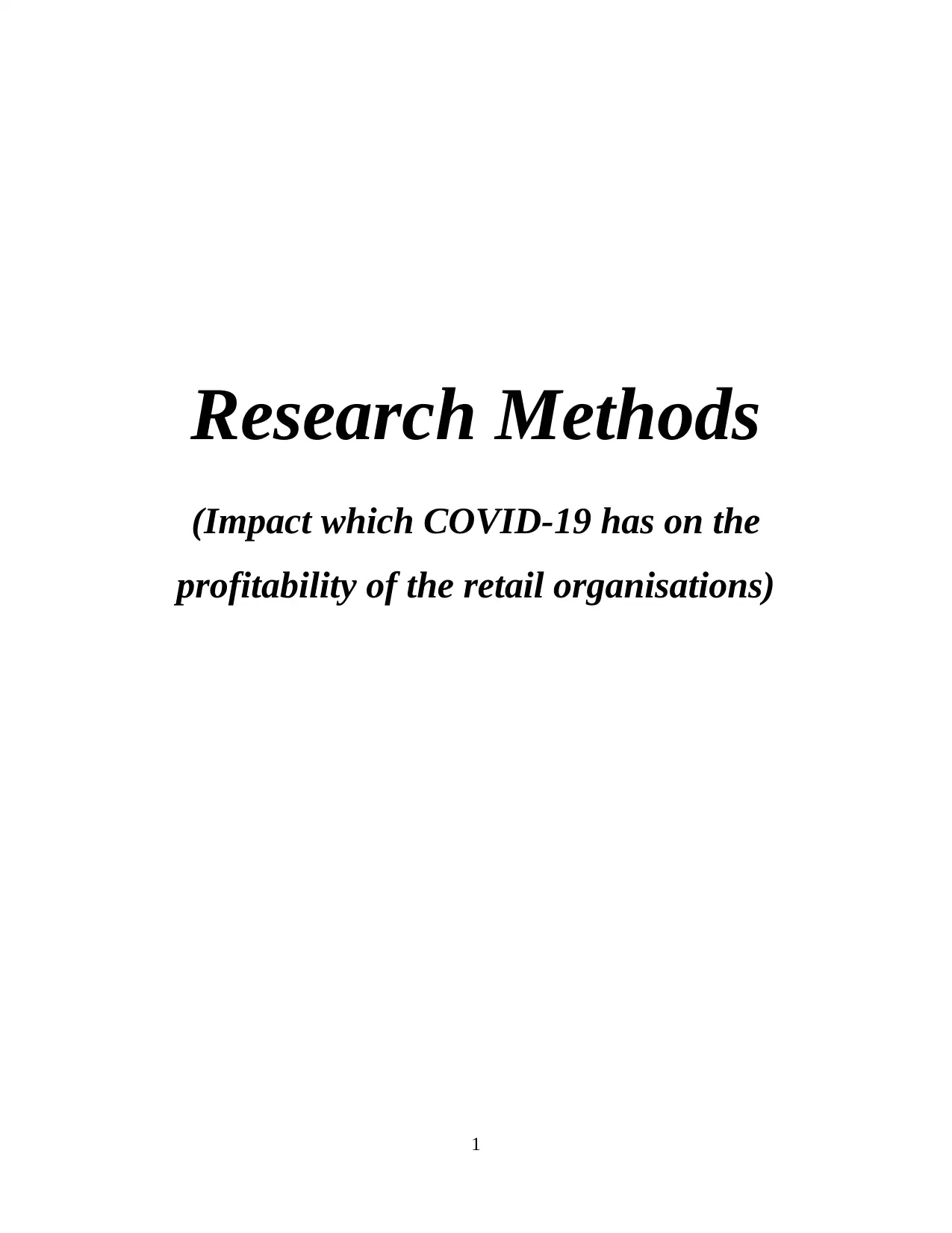
Research Methods
(Impact which COVID-19 has on the
profitability of the retail organisations)
1
(Impact which COVID-19 has on the
profitability of the retail organisations)
1
Paraphrase This Document
Need a fresh take? Get an instant paraphrase of this document with our AI Paraphraser
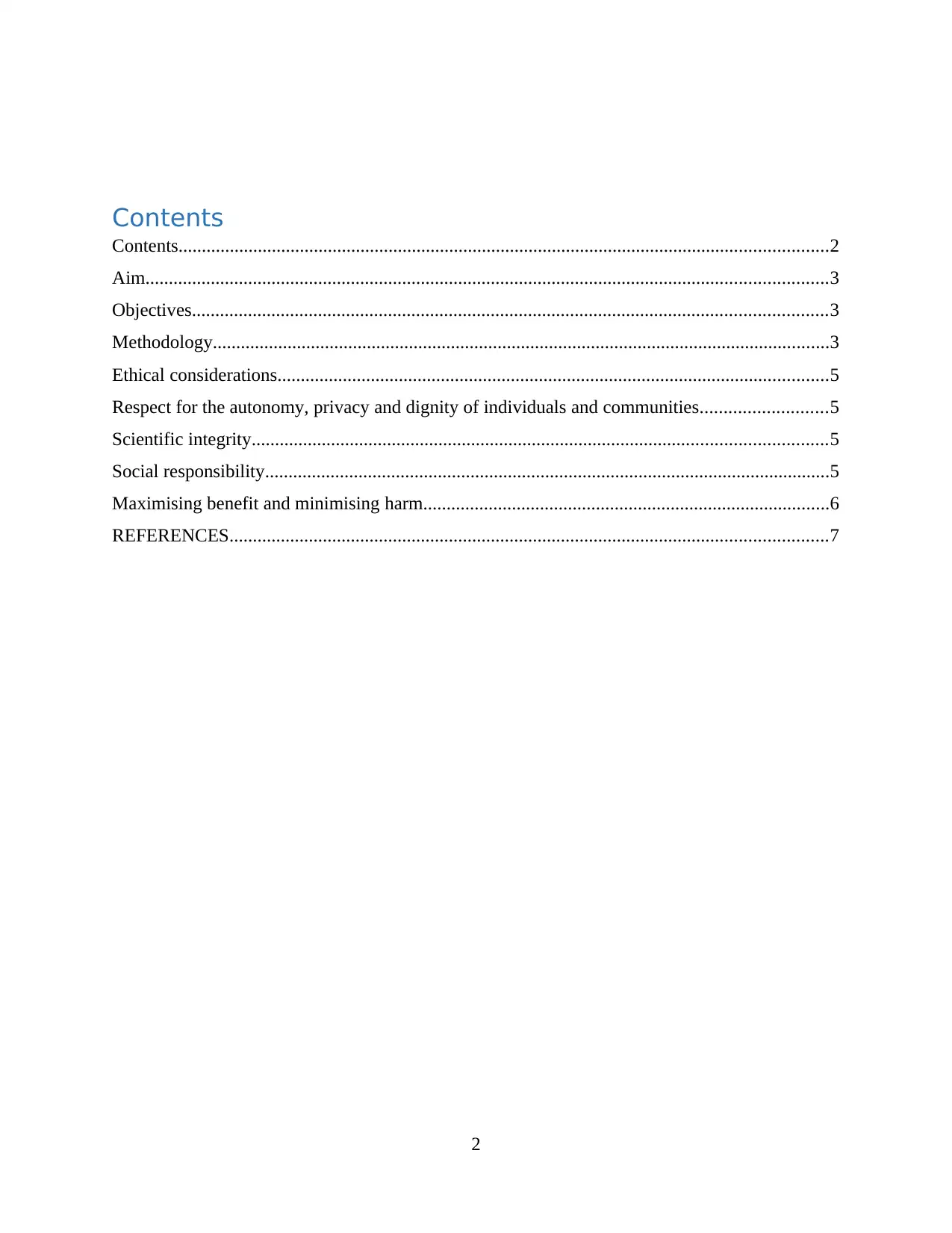
Contents
Contents...........................................................................................................................................2
Aim..................................................................................................................................................3
Objectives........................................................................................................................................3
Methodology....................................................................................................................................3
Ethical considerations......................................................................................................................5
Respect for the autonomy, privacy and dignity of individuals and communities...........................5
Scientific integrity...........................................................................................................................5
Social responsibility.........................................................................................................................5
Maximising benefit and minimising harm.......................................................................................6
REFERENCES................................................................................................................................7
2
Contents...........................................................................................................................................2
Aim..................................................................................................................................................3
Objectives........................................................................................................................................3
Methodology....................................................................................................................................3
Ethical considerations......................................................................................................................5
Respect for the autonomy, privacy and dignity of individuals and communities...........................5
Scientific integrity...........................................................................................................................5
Social responsibility.........................................................................................................................5
Maximising benefit and minimising harm.......................................................................................6
REFERENCES................................................................................................................................7
2
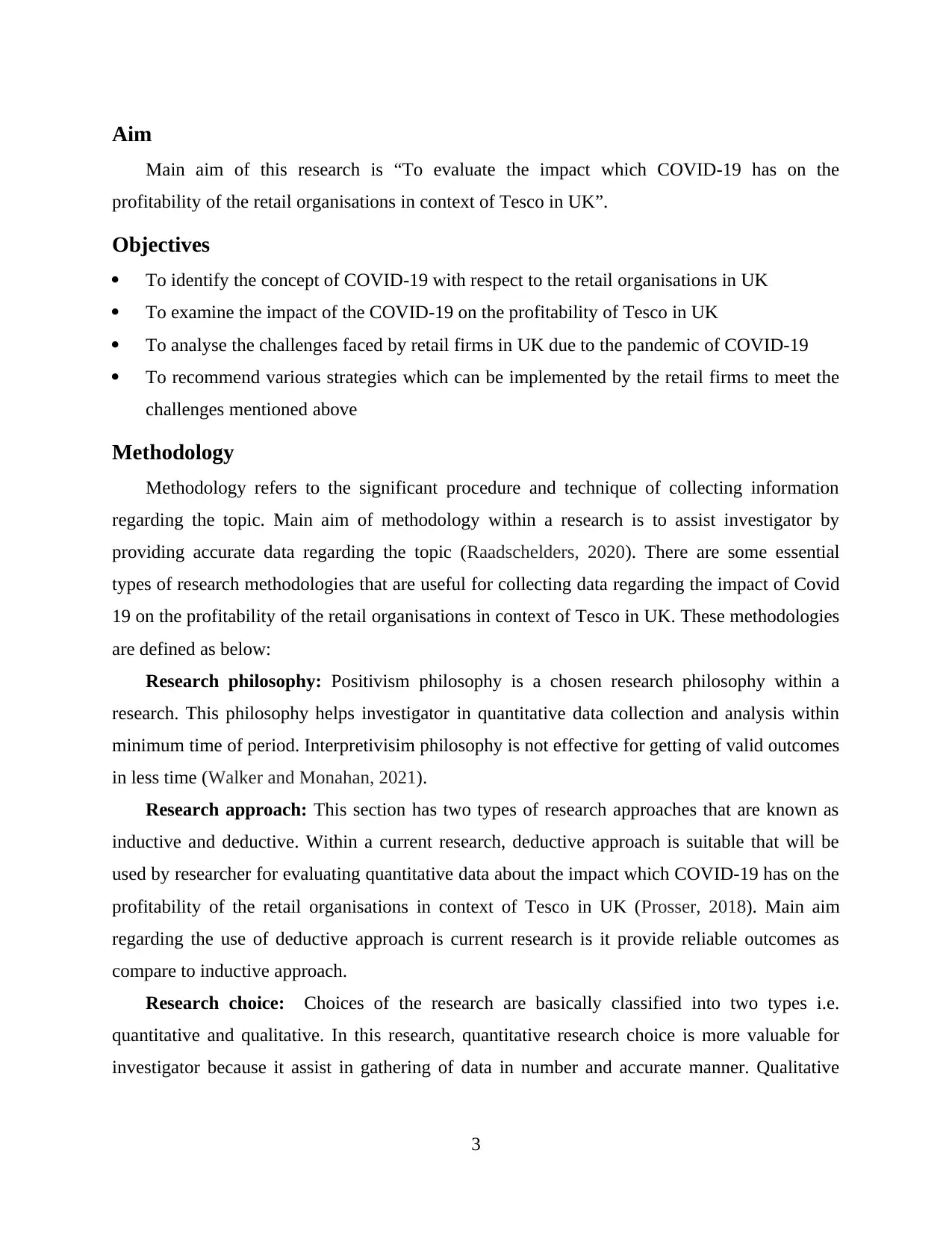
Aim
Main aim of this research is “To evaluate the impact which COVID-19 has on the
profitability of the retail organisations in context of Tesco in UK”.
Objectives
To identify the concept of COVID-19 with respect to the retail organisations in UK
To examine the impact of the COVID-19 on the profitability of Tesco in UK
To analyse the challenges faced by retail firms in UK due to the pandemic of COVID-19
To recommend various strategies which can be implemented by the retail firms to meet the
challenges mentioned above
Methodology
Methodology refers to the significant procedure and technique of collecting information
regarding the topic. Main aim of methodology within a research is to assist investigator by
providing accurate data regarding the topic (Raadschelders, 2020). There are some essential
types of research methodologies that are useful for collecting data regarding the impact of Covid
19 on the profitability of the retail organisations in context of Tesco in UK. These methodologies
are defined as below:
Research philosophy: Positivism philosophy is a chosen research philosophy within a
research. This philosophy helps investigator in quantitative data collection and analysis within
minimum time of period. Interpretivisim philosophy is not effective for getting of valid outcomes
in less time (Walker and Monahan, 2021).
Research approach: This section has two types of research approaches that are known as
inductive and deductive. Within a current research, deductive approach is suitable that will be
used by researcher for evaluating quantitative data about the impact which COVID-19 has on the
profitability of the retail organisations in context of Tesco in UK (Prosser, 2018). Main aim
regarding the use of deductive approach is current research is it provide reliable outcomes as
compare to inductive approach.
Research choice: Choices of the research are basically classified into two types i.e.
quantitative and qualitative. In this research, quantitative research choice is more valuable for
investigator because it assist in gathering of data in number and accurate manner. Qualitative
3
Main aim of this research is “To evaluate the impact which COVID-19 has on the
profitability of the retail organisations in context of Tesco in UK”.
Objectives
To identify the concept of COVID-19 with respect to the retail organisations in UK
To examine the impact of the COVID-19 on the profitability of Tesco in UK
To analyse the challenges faced by retail firms in UK due to the pandemic of COVID-19
To recommend various strategies which can be implemented by the retail firms to meet the
challenges mentioned above
Methodology
Methodology refers to the significant procedure and technique of collecting information
regarding the topic. Main aim of methodology within a research is to assist investigator by
providing accurate data regarding the topic (Raadschelders, 2020). There are some essential
types of research methodologies that are useful for collecting data regarding the impact of Covid
19 on the profitability of the retail organisations in context of Tesco in UK. These methodologies
are defined as below:
Research philosophy: Positivism philosophy is a chosen research philosophy within a
research. This philosophy helps investigator in quantitative data collection and analysis within
minimum time of period. Interpretivisim philosophy is not effective for getting of valid outcomes
in less time (Walker and Monahan, 2021).
Research approach: This section has two types of research approaches that are known as
inductive and deductive. Within a current research, deductive approach is suitable that will be
used by researcher for evaluating quantitative data about the impact which COVID-19 has on the
profitability of the retail organisations in context of Tesco in UK (Prosser, 2018). Main aim
regarding the use of deductive approach is current research is it provide reliable outcomes as
compare to inductive approach.
Research choice: Choices of the research are basically classified into two types i.e.
quantitative and qualitative. In this research, quantitative research choice is more valuable for
investigator because it assist in gathering of data in number and accurate manner. Qualitative
3
⊘ This is a preview!⊘
Do you want full access?
Subscribe today to unlock all pages.

Trusted by 1+ million students worldwide
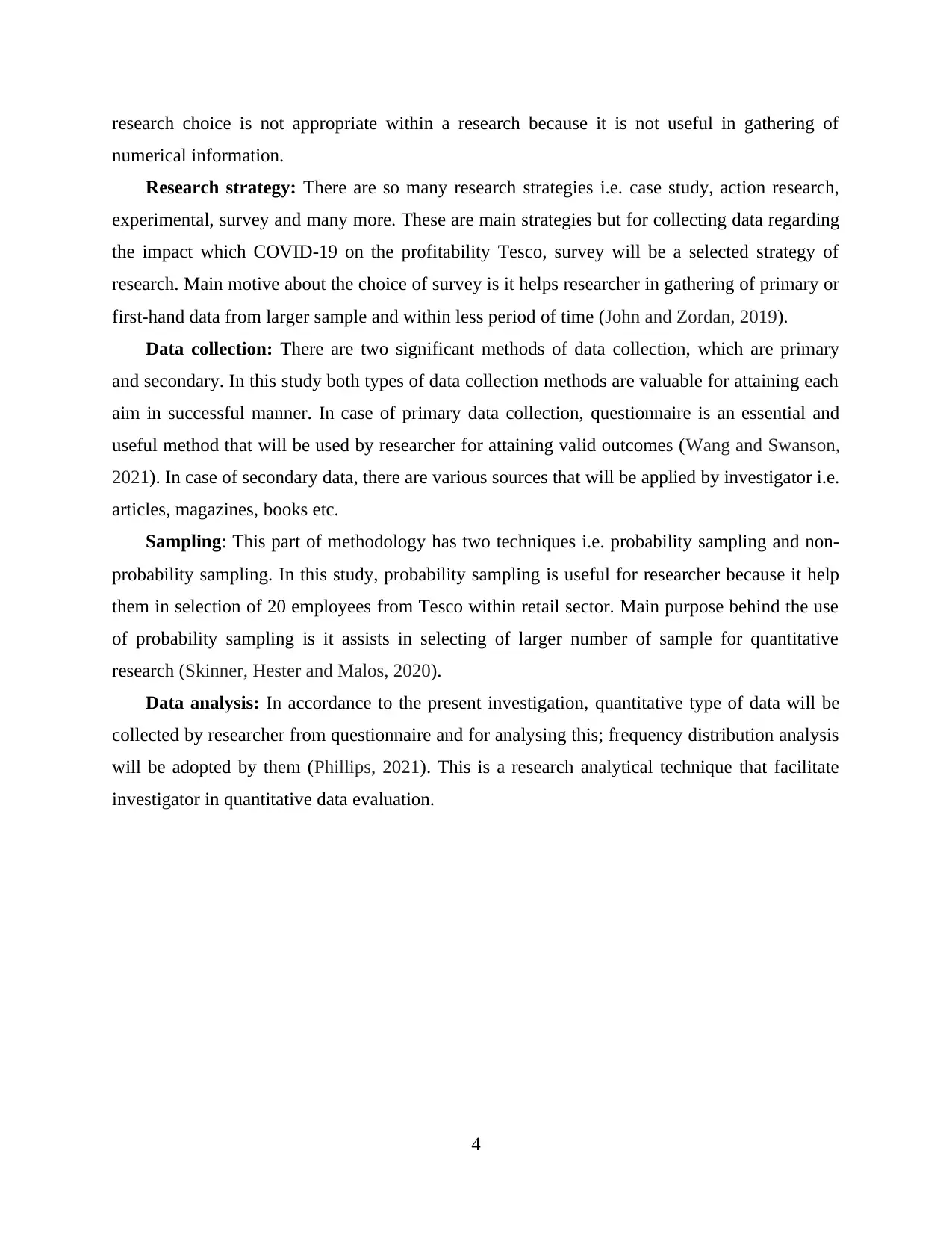
research choice is not appropriate within a research because it is not useful in gathering of
numerical information.
Research strategy: There are so many research strategies i.e. case study, action research,
experimental, survey and many more. These are main strategies but for collecting data regarding
the impact which COVID-19 on the profitability Tesco, survey will be a selected strategy of
research. Main motive about the choice of survey is it helps researcher in gathering of primary or
first-hand data from larger sample and within less period of time (John and Zordan, 2019).
Data collection: There are two significant methods of data collection, which are primary
and secondary. In this study both types of data collection methods are valuable for attaining each
aim in successful manner. In case of primary data collection, questionnaire is an essential and
useful method that will be used by researcher for attaining valid outcomes (Wang and Swanson,
2021). In case of secondary data, there are various sources that will be applied by investigator i.e.
articles, magazines, books etc.
Sampling: This part of methodology has two techniques i.e. probability sampling and non-
probability sampling. In this study, probability sampling is useful for researcher because it help
them in selection of 20 employees from Tesco within retail sector. Main purpose behind the use
of probability sampling is it assists in selecting of larger number of sample for quantitative
research (Skinner, Hester and Malos, 2020).
Data analysis: In accordance to the present investigation, quantitative type of data will be
collected by researcher from questionnaire and for analysing this; frequency distribution analysis
will be adopted by them (Phillips, 2021). This is a research analytical technique that facilitate
investigator in quantitative data evaluation.
4
numerical information.
Research strategy: There are so many research strategies i.e. case study, action research,
experimental, survey and many more. These are main strategies but for collecting data regarding
the impact which COVID-19 on the profitability Tesco, survey will be a selected strategy of
research. Main motive about the choice of survey is it helps researcher in gathering of primary or
first-hand data from larger sample and within less period of time (John and Zordan, 2019).
Data collection: There are two significant methods of data collection, which are primary
and secondary. In this study both types of data collection methods are valuable for attaining each
aim in successful manner. In case of primary data collection, questionnaire is an essential and
useful method that will be used by researcher for attaining valid outcomes (Wang and Swanson,
2021). In case of secondary data, there are various sources that will be applied by investigator i.e.
articles, magazines, books etc.
Sampling: This part of methodology has two techniques i.e. probability sampling and non-
probability sampling. In this study, probability sampling is useful for researcher because it help
them in selection of 20 employees from Tesco within retail sector. Main purpose behind the use
of probability sampling is it assists in selecting of larger number of sample for quantitative
research (Skinner, Hester and Malos, 2020).
Data analysis: In accordance to the present investigation, quantitative type of data will be
collected by researcher from questionnaire and for analysing this; frequency distribution analysis
will be adopted by them (Phillips, 2021). This is a research analytical technique that facilitate
investigator in quantitative data evaluation.
4
Paraphrase This Document
Need a fresh take? Get an instant paraphrase of this document with our AI Paraphraser
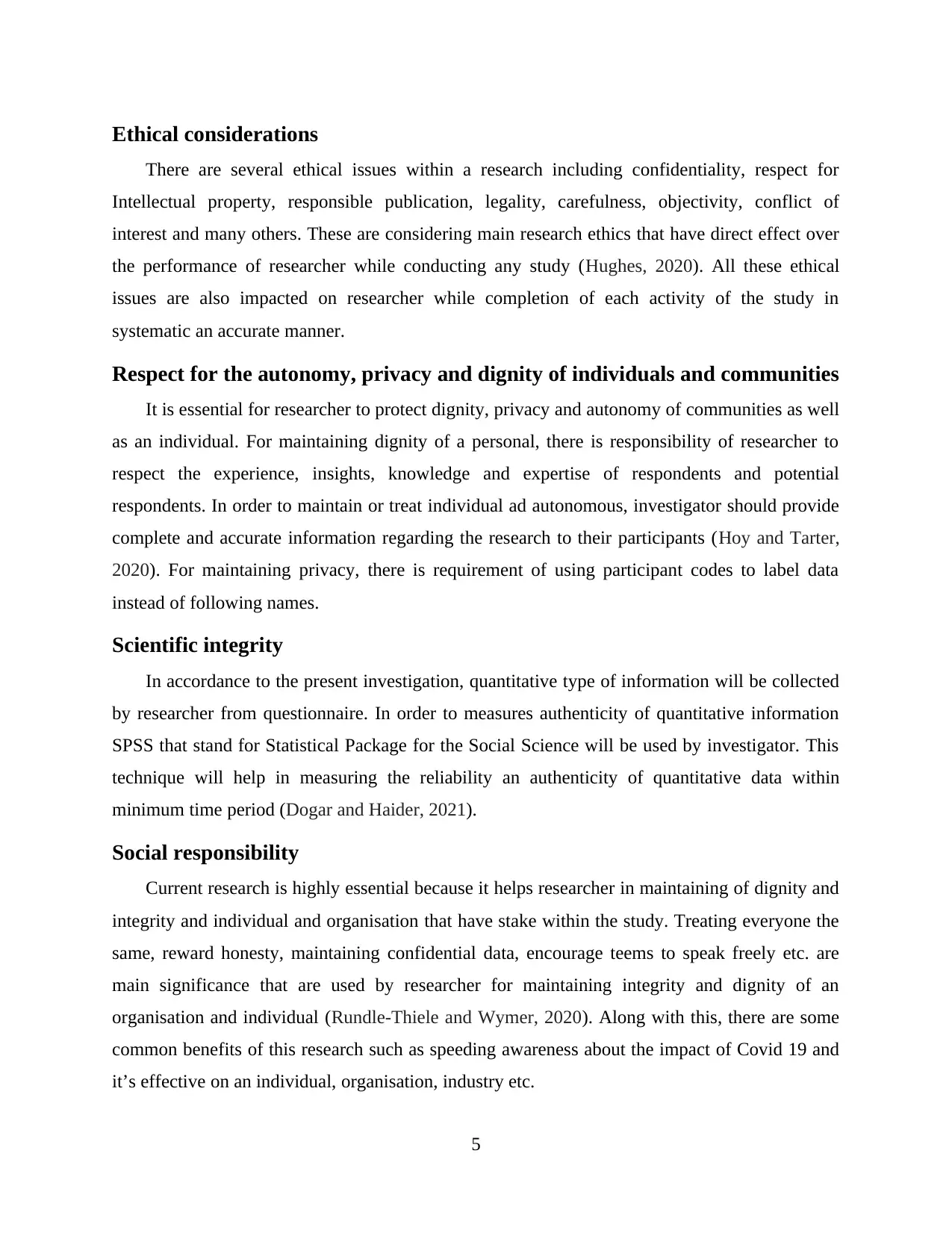
Ethical considerations
There are several ethical issues within a research including confidentiality, respect for
Intellectual property, responsible publication, legality, carefulness, objectivity, conflict of
interest and many others. These are considering main research ethics that have direct effect over
the performance of researcher while conducting any study (Hughes, 2020). All these ethical
issues are also impacted on researcher while completion of each activity of the study in
systematic an accurate manner.
Respect for the autonomy, privacy and dignity of individuals and communities
It is essential for researcher to protect dignity, privacy and autonomy of communities as well
as an individual. For maintaining dignity of a personal, there is responsibility of researcher to
respect the experience, insights, knowledge and expertise of respondents and potential
respondents. In order to maintain or treat individual ad autonomous, investigator should provide
complete and accurate information regarding the research to their participants (Hoy and Tarter,
2020). For maintaining privacy, there is requirement of using participant codes to label data
instead of following names.
Scientific integrity
In accordance to the present investigation, quantitative type of information will be collected
by researcher from questionnaire. In order to measures authenticity of quantitative information
SPSS that stand for Statistical Package for the Social Science will be used by investigator. This
technique will help in measuring the reliability an authenticity of quantitative data within
minimum time period (Dogar and Haider, 2021).
Social responsibility
Current research is highly essential because it helps researcher in maintaining of dignity and
integrity and individual and organisation that have stake within the study. Treating everyone the
same, reward honesty, maintaining confidential data, encourage teems to speak freely etc. are
main significance that are used by researcher for maintaining integrity and dignity of an
organisation and individual (Rundle-Thiele and Wymer, 2020). Along with this, there are some
common benefits of this research such as speeding awareness about the impact of Covid 19 and
it’s effective on an individual, organisation, industry etc.
5
There are several ethical issues within a research including confidentiality, respect for
Intellectual property, responsible publication, legality, carefulness, objectivity, conflict of
interest and many others. These are considering main research ethics that have direct effect over
the performance of researcher while conducting any study (Hughes, 2020). All these ethical
issues are also impacted on researcher while completion of each activity of the study in
systematic an accurate manner.
Respect for the autonomy, privacy and dignity of individuals and communities
It is essential for researcher to protect dignity, privacy and autonomy of communities as well
as an individual. For maintaining dignity of a personal, there is responsibility of researcher to
respect the experience, insights, knowledge and expertise of respondents and potential
respondents. In order to maintain or treat individual ad autonomous, investigator should provide
complete and accurate information regarding the research to their participants (Hoy and Tarter,
2020). For maintaining privacy, there is requirement of using participant codes to label data
instead of following names.
Scientific integrity
In accordance to the present investigation, quantitative type of information will be collected
by researcher from questionnaire. In order to measures authenticity of quantitative information
SPSS that stand for Statistical Package for the Social Science will be used by investigator. This
technique will help in measuring the reliability an authenticity of quantitative data within
minimum time period (Dogar and Haider, 2021).
Social responsibility
Current research is highly essential because it helps researcher in maintaining of dignity and
integrity and individual and organisation that have stake within the study. Treating everyone the
same, reward honesty, maintaining confidential data, encourage teems to speak freely etc. are
main significance that are used by researcher for maintaining integrity and dignity of an
organisation and individual (Rundle-Thiele and Wymer, 2020). Along with this, there are some
common benefits of this research such as speeding awareness about the impact of Covid 19 and
it’s effective on an individual, organisation, industry etc.
5
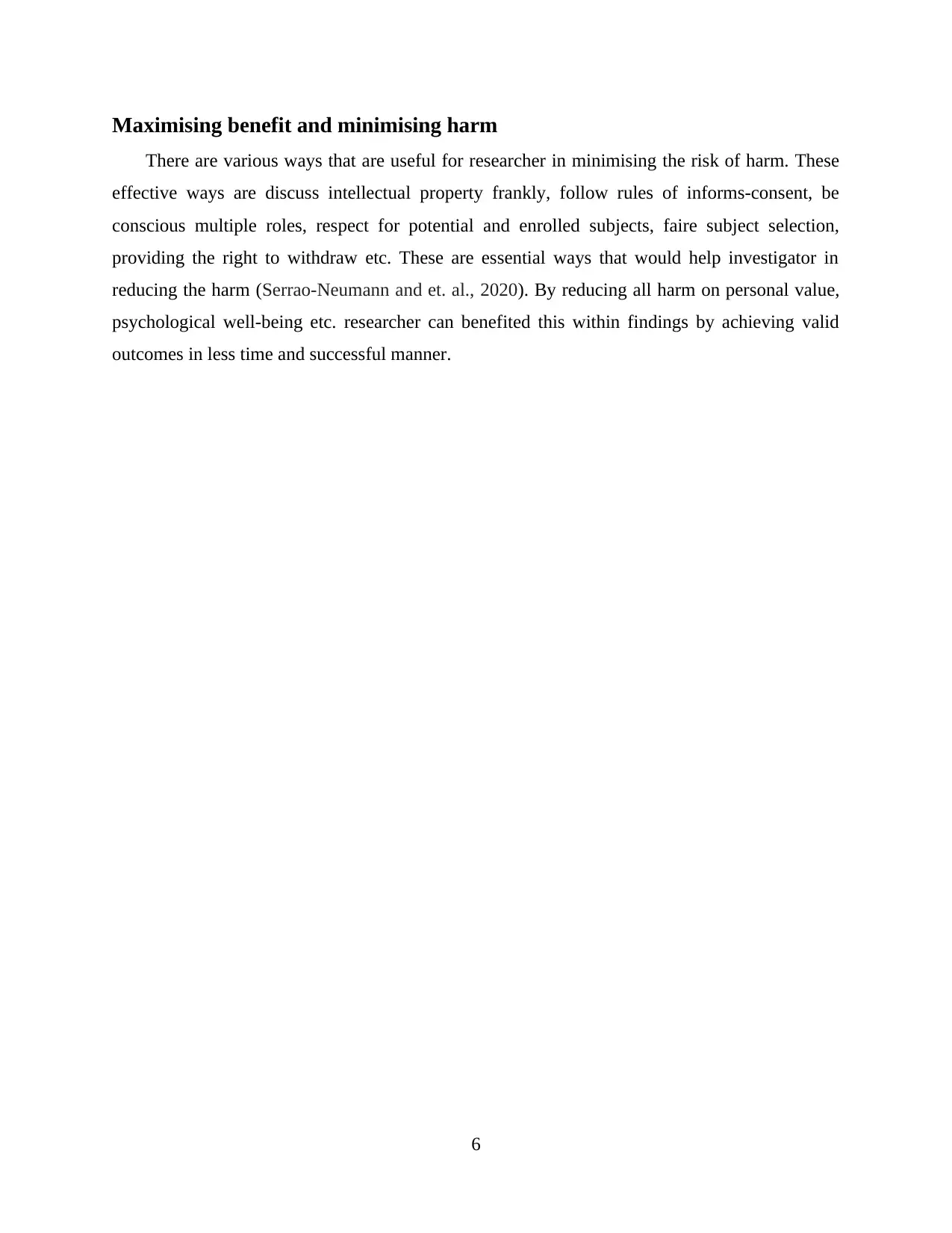
Maximising benefit and minimising harm
There are various ways that are useful for researcher in minimising the risk of harm. These
effective ways are discuss intellectual property frankly, follow rules of informs-consent, be
conscious multiple roles, respect for potential and enrolled subjects, faire subject selection,
providing the right to withdraw etc. These are essential ways that would help investigator in
reducing the harm (Serrao-Neumann and et. al., 2020). By reducing all harm on personal value,
psychological well-being etc. researcher can benefited this within findings by achieving valid
outcomes in less time and successful manner.
6
There are various ways that are useful for researcher in minimising the risk of harm. These
effective ways are discuss intellectual property frankly, follow rules of informs-consent, be
conscious multiple roles, respect for potential and enrolled subjects, faire subject selection,
providing the right to withdraw etc. These are essential ways that would help investigator in
reducing the harm (Serrao-Neumann and et. al., 2020). By reducing all harm on personal value,
psychological well-being etc. researcher can benefited this within findings by achieving valid
outcomes in less time and successful manner.
6
⊘ This is a preview!⊘
Do you want full access?
Subscribe today to unlock all pages.

Trusted by 1+ million students worldwide
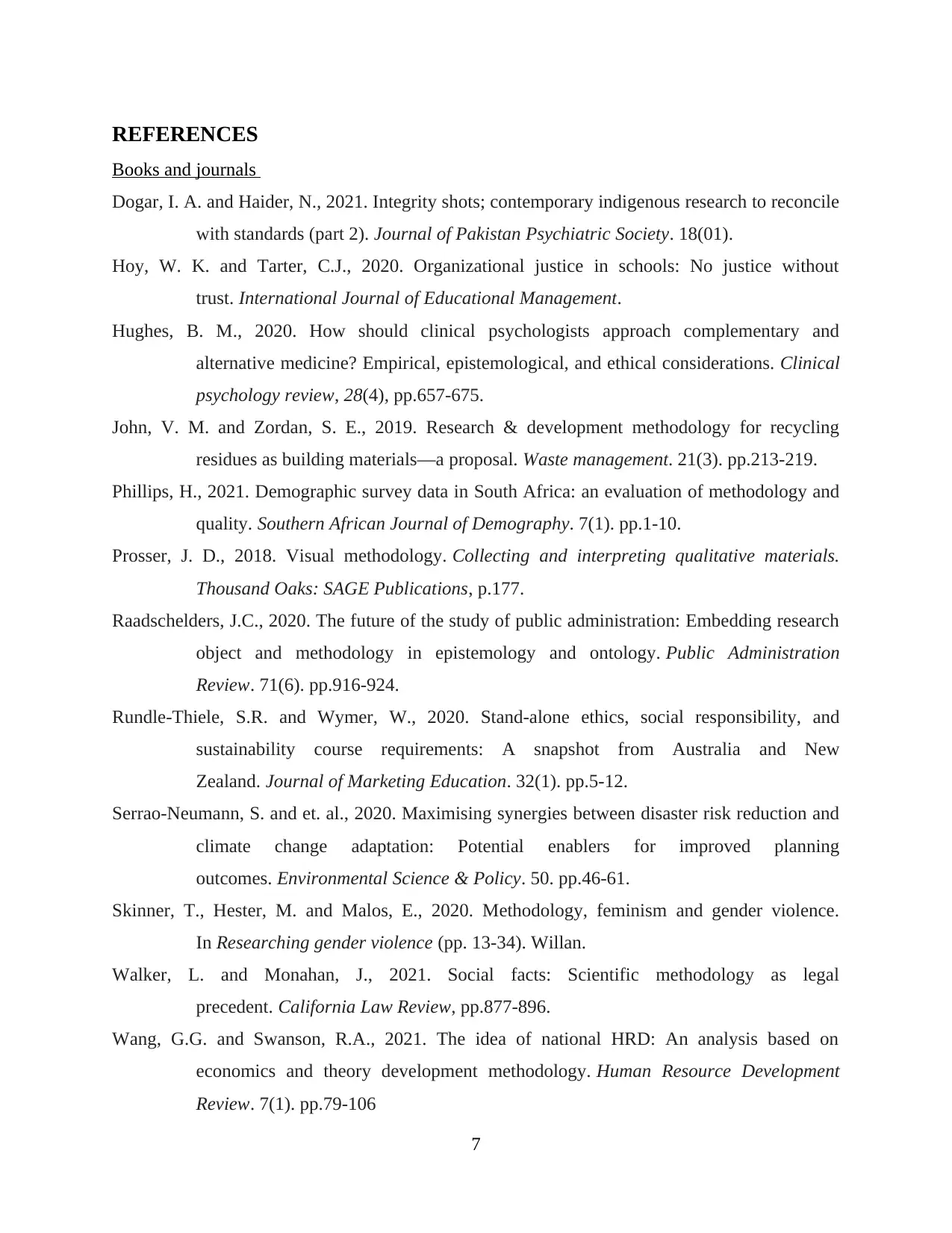
REFERENCES
Books and journals
Dogar, I. A. and Haider, N., 2021. Integrity shots; contemporary indigenous research to reconcile
with standards (part 2). Journal of Pakistan Psychiatric Society. 18(01).
Hoy, W. K. and Tarter, C.J., 2020. Organizational justice in schools: No justice without
trust. International Journal of Educational Management.
Hughes, B. M., 2020. How should clinical psychologists approach complementary and
alternative medicine? Empirical, epistemological, and ethical considerations. Clinical
psychology review, 28(4), pp.657-675.
John, V. M. and Zordan, S. E., 2019. Research & development methodology for recycling
residues as building materials—a proposal. Waste management. 21(3). pp.213-219.
Phillips, H., 2021. Demographic survey data in South Africa: an evaluation of methodology and
quality. Southern African Journal of Demography. 7(1). pp.1-10.
Prosser, J. D., 2018. Visual methodology. Collecting and interpreting qualitative materials.
Thousand Oaks: SAGE Publications, p.177.
Raadschelders, J.C., 2020. The future of the study of public administration: Embedding research
object and methodology in epistemology and ontology. Public Administration
Review. 71(6). pp.916-924.
Rundle-Thiele, S.R. and Wymer, W., 2020. Stand-alone ethics, social responsibility, and
sustainability course requirements: A snapshot from Australia and New
Zealand. Journal of Marketing Education. 32(1). pp.5-12.
Serrao-Neumann, S. and et. al., 2020. Maximising synergies between disaster risk reduction and
climate change adaptation: Potential enablers for improved planning
outcomes. Environmental Science & Policy. 50. pp.46-61.
Skinner, T., Hester, M. and Malos, E., 2020. Methodology, feminism and gender violence.
In Researching gender violence (pp. 13-34). Willan.
Walker, L. and Monahan, J., 2021. Social facts: Scientific methodology as legal
precedent. California Law Review, pp.877-896.
Wang, G.G. and Swanson, R.A., 2021. The idea of national HRD: An analysis based on
economics and theory development methodology. Human Resource Development
Review. 7(1). pp.79-106
7
Books and journals
Dogar, I. A. and Haider, N., 2021. Integrity shots; contemporary indigenous research to reconcile
with standards (part 2). Journal of Pakistan Psychiatric Society. 18(01).
Hoy, W. K. and Tarter, C.J., 2020. Organizational justice in schools: No justice without
trust. International Journal of Educational Management.
Hughes, B. M., 2020. How should clinical psychologists approach complementary and
alternative medicine? Empirical, epistemological, and ethical considerations. Clinical
psychology review, 28(4), pp.657-675.
John, V. M. and Zordan, S. E., 2019. Research & development methodology for recycling
residues as building materials—a proposal. Waste management. 21(3). pp.213-219.
Phillips, H., 2021. Demographic survey data in South Africa: an evaluation of methodology and
quality. Southern African Journal of Demography. 7(1). pp.1-10.
Prosser, J. D., 2018. Visual methodology. Collecting and interpreting qualitative materials.
Thousand Oaks: SAGE Publications, p.177.
Raadschelders, J.C., 2020. The future of the study of public administration: Embedding research
object and methodology in epistemology and ontology. Public Administration
Review. 71(6). pp.916-924.
Rundle-Thiele, S.R. and Wymer, W., 2020. Stand-alone ethics, social responsibility, and
sustainability course requirements: A snapshot from Australia and New
Zealand. Journal of Marketing Education. 32(1). pp.5-12.
Serrao-Neumann, S. and et. al., 2020. Maximising synergies between disaster risk reduction and
climate change adaptation: Potential enablers for improved planning
outcomes. Environmental Science & Policy. 50. pp.46-61.
Skinner, T., Hester, M. and Malos, E., 2020. Methodology, feminism and gender violence.
In Researching gender violence (pp. 13-34). Willan.
Walker, L. and Monahan, J., 2021. Social facts: Scientific methodology as legal
precedent. California Law Review, pp.877-896.
Wang, G.G. and Swanson, R.A., 2021. The idea of national HRD: An analysis based on
economics and theory development methodology. Human Resource Development
Review. 7(1). pp.79-106
7
1 out of 7
Related Documents
Your All-in-One AI-Powered Toolkit for Academic Success.
+13062052269
info@desklib.com
Available 24*7 on WhatsApp / Email
![[object Object]](/_next/static/media/star-bottom.7253800d.svg)
Unlock your academic potential
Copyright © 2020–2026 A2Z Services. All Rights Reserved. Developed and managed by ZUCOL.




